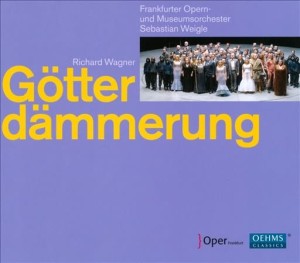As readers of this type of thing know, I genuinely admired the Siegfried from this same source, and I feel just as strongly about this new Götterdämmerung. Conductor Sebastian Weigle told a good story in that Siegfried, and he does here as well. Tempos and forward-movement are well-judged, save for the start of the third act, where the Rhinemaidens/Siegfried scene drags, and because the opera was recorded live (in January and February, 2012 over several performances), there is, again, a sense of something real happening throughout. The characters play off one another, diction is close to flawless; we can hear the sarcasm in Hagen as well as the craziness in Alberich, and oddly, Gunther is seen as a more three-dimensional figure.
Again—and this may sound like a negative—Weigle takes an almost chamber-like approach, and the recording engineers are entirely on his side. We are made aware of Wagner’s economical orchestration during the many “conversations” and, most remarkably, in the trio for Gunther, Brünnhilde, and Hagen that ends the second act. Because of this intimate approach it sounds even sneakier and more vicious than usual. The quiet evil with which the second act begins (the Alberich/Hagen scene) is about as creepy as anything I’ve ever heard, with the high strings nervously stuttering and the winds and brass roiling—not to mention those trills on the Wagner tubas as the scene changes! I could cite many examples, but anyone listening to the atmosphere just as the Norns begin will realize that something very special is going on. And it isn’t Boulezian in its dissection or Böhmesque in its quick, pointed intensity. Wagner’s solos for winds are as suddenly noticeable as Mozart’s. You are never bombarded by sound save for the truly big moments: the end of the prologue, the scene with the vassals, Siegfried’s Funeral March, and the final cataclysm, making these moments all the more powerful.
The cast is worthy. I don’t know from how many performances this set was assembled, but the applause at the end of each act is pretty impressive. Lance Ryan, perhaps not as fresh as he was in the Forging Song of Siegfried, remains a bright-voiced hero. Again, both of his high Cs are amazing—he holds on to the big one, as he greets Hagen after the Rhinemaiden scene in the last act, longer than is written, and who can blame him? There are tiny pitch problems, but in general he is in solid voice. He is very moving in his death scene, phrasing handsomely and with a quiet resignation that is unbeatable on recordings.
Susan Bullock continues the Cycle as Brünnhilde, and she is in better voice here than in Siegfried. The vibrato is still too loose, but particularly after the prologue, she gains strength. Every word counts: her conviction in the Waltraute scene; her horror when a stranger breaks through the fire; her reaction to Siegfried’s entrance for the Wedding Scene; the trio (mentioned above); and a fine Immolation Scene. I’ve opted out of comparing her with the usual suspects (Nilsson, Varnay, Flagstad), but suffice it to say that as far as wedding the words and music, she’s second to none, and her enunciation is spotless . And my previous criticism that she does not sound young really does not apply here. Yes, I’d like a more elegant sound, with the highest notes more solid, but this is a world-class performance.
Gregory Frank is not a pitch-black, Gottlob Frick/Matti Salminen type of Hagen. The voice is big and dark enough, though, and he has an audible sneer that can send chills down the spine. His hatred, jealousy, and cunning are omnipresent, and he’s a fine phony in the first act. Johannes Martin Kränzle is the Gunther. I had seen a DVD of his terrific Beckmesser from Glyndebourne just days before encountering him on this set and he’s remarkable; indeed his portrayal of Gunther is the most important I’ve come across. He has true stature at home; he is a proud man. But his disgust at Hagen’s murder of Siegfried is palpable, and it is not just for Hagen: he hates himself for his gullibility.
Jochen Schmeckenbecher’s Alberich is about as unnerving as any you will ever hear in his scene with Hagen. Dirty business is truly afoot. Mezzo Claudia Mahnke is a sincere, urgent Waltraute who nonetheless does not erase memories of Christa Ludwig, or more recently, Waltraud Meier. Anja Fidelia Ulrich is a good, alluring Gutrune. The three Norns are excellent (Mahnke is the second; Meredith Arwady is the first; and the deliciously-named Angel Blue is the third); the Rhinemaidens are very expressive but not particularly lovely.
The chorus, so rough-motorcycle-gang-jubilant in Act 2 and so horrified in Act 3, is another of this set’s glories. Along with Weigle’s non-intrusive, clear-as-a-bell story-telling and the stunning playing of the Frankfurt Opera, this set is a winner. It’s among the most committed sets around. The sonics are spectacular. No, it doesn’t replace Keilberth ’55 (Testament) or Krauss ’53 (Opera d’Oro), or perhaps even the still amazing Solti (Decca) or Böhm (Philips). But it doesn’t have to; it should be proud to be in the running.
































